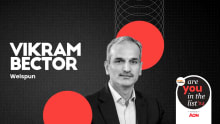In Search of Change Maestros - Series V
I enjoy the boardroom discussions and I am equally excited at the shop floor because that is where the real knowledge comes from
My belief in the ability of my people and the fact that anything is achievable has helped me make the right judgement on each project
Where Sky is the Limit
The journey of JSW has been arduous and eventful since 1992 when Sajjan Jindal inherited a small re-rolling mill in Tarapur in Maharashtra. Known as a leader with the spirit of a tiger, Sajjan Jindal shares his journey of constant pursuit of excellence that has enabled him to expand the size of his dream each time he achieved a milestone. He shares, his passion and the need to take decisions fast are two key factors that helped create an organization that is transparent, empowering and rewarding for all stakeholders.
At a young age of twenty- three, fresh out of college, Sajjan Jindal began his journey to build JSW and take it to newer heights. From a Rs. 93 crore company in 1993, the group has shown an impressive growth to becoming a Rs. 20,000 crore behemoth in 2011. Embracing a collective growth approach JSW’s vision is growth while staying focussed on development of the society and the environment as evident from the choice of technology used which consciously aims at reducing discharge of effluents, smoke, sulphur, and polluting gases. Keeping its eye on continuous growth, the company plans to become a Rs. 50,000 crore company by 2012, along with expansion, revenues, community development and CSR activities. The organization’s robust business model, which constantly looks at forward and backward integration, is greatly responsible for enabling such a multi-fold and progressive growth.
10 Steps to Jindal’s Success
Mega Growth Vision: JSW’s mega vision is seen in the pace of growth achieved within a decade in terms of turnover as well as steel tonnage. The company is slated to achieve 5mt capacity by 2012.
Entrepreneurial DNA: JSW’s entrepreneurial DNA has created an environment that supports risk-taking, speaking out, exploration of innovative solutions, and excitement at the workplace, besides creating a sense of ownership.
Towards the Next Milestone: Agility is the rule of the game for survival and winning in the competitive world. This enables them to capture the market, take advantage of emerging trends, and reap benefits of being a first mover.
Empowerment with Accountability: Contribution, result-orientation, and performance reward, are a part of the genetic code of JSW. Once a person is put on the right job, he/she is given the full freedom to function and experiment, with accountability.
Quest for Excellence: Winning, excelling, growing and competing are vital components of the JSW DNA and they continuously raise the bar of excellence.
High Performance Recognition: Performance milestone are clearly stated and targets are set around that. Performance is rewarded where even 30% of the high performing junior management is eligible for ESOPs.
People Focus: The company not only cares for direct employees but also displays concern for contract employees.
Ethical Governance: JSW epitomizes the perennial Indian wisdom that ‘truth ultimately triumphs’. Their path of entrepreneurial credibility is based on a long term perspective, with no scope for shortcuts.
Beyond Profit - Social Concerns: They see their role beyond profits, in terms of serving the interest of all stakeholders – shareholders, customers, employees, suppliers, vendors and community. They follow the Gandhian trusteeship model and believe that they are the custodians of public money and therefore use it for the benefit of the community and society.
Shaping Talent: JSW has a robust performance appraisal system which links rewards directly to employee performance, career planning, and identification of fast trackers, as well as a 360 degree appraisal for the top and senior level management.
PS: What is the dream that you seek to achieve through JSW?
I want JSW to play a role in building the nation. As an organization, we are aggressive, bold, and sharp, and take decisions very fast. We take a lot of risks because I believe that growth will only come if the right risks are taken. Only if we can grow as an organization, can we contribute to the collective growth of the country. There are only 20-30 leaders in the country and I believe we could play one of those 20-30 roles in taking this country forward.
AB: What is the foundation of this dream?
If I go back in time, I never imagined I would reach this far. I always had the passion to do something out of the ordinary. While in school I would watch my father work - an engineer by training and not profession - and I was inspired by watching him work in the factory. After graduating in engineering, I was made the CEO of small plant in Bombay at the age of 24. I was told I could expand if I did well but my father was very clear that I could not go back to him if I failed. I was determined to make a difference.
AB: How were the initial days working in the steel industry?
In 1991, the Karnataka government invited me to build a project. My father thought I was too young to start a steel plant because I was only 30 years old then, and he thought I would lose my appetite and peace of mind given the complexity of starting a steel plant. But I convinced him about my ambition to build a steel plant. I went to inspect the site with my brother, who already had the experience of building 3-4 projects, and we realized it was a very dry and hostile site which made our work more difficult.
AB: Please share your early journey in taking up such mammoth tasks?
I started living there to build the team and every day brought a different challenge. We enjoyed building the plant and created a beautiful dome shape building. When I met with Mr. N. Vaghul, the then Chairman of ICICI Bank for financial support, he asked, ‘Why do you think you will be successful and how can you build such a project when you have no background?’ But my conviction to play a crucial role in building the nation and our aggressive, bold, sharp nature with the ability to take decisions very fast as a group, finally won him over.
AB: How was your father’s advice useful in this journey?
My father always said hard work and perseverance will bring success. He always emphasized the need to have control over mining, and said ‘when the mine starts delivering, there is no limit to money’. In 1998-1999 when I set out to build my first steel plant, I contemplated on what my father said and decided to reconsider building that project because of the hostile environment in that place.
PS: Having started so young, what enabled you to see success in everything you have undertaken?
My belief in the ability of my people and the fact that anything is achievable if viewed objectively has helped me make the right judgement on each project. We are careful about technology selection, we do market surveys to assess the pulse of the deal and as a team we are very equipped to build a project. When I met Vaghul, he said when he writes his book on young Indians once he retires, he would include me as one of the people he will write about. He was impressed that at the age of 30, I was thinking of building this integrated plant and wanted to build a world class facility, and eventually impact the society.
PS: What challenges did you face on this journey?
Around 1999-2000, when steel industry was passing through a difficult phase, we suffered a major setback when the first Corex plant was started. Corex was a new technology which saw a lot of criticism but I was convinced that it would work. Its failure was a huge impediment. My top team resigned, and that changed my complete attitude towards business and life. The steel industry was not doing well and the rising criticism made bankers nervous. Somehow I was completely unmoved and immediately called a meeting to explain how we can use this as an opportunity to build a world class company from scratch. I had faith in the ability of people and so I was confident that if we do things honestly, with the right determination, we can get ahead easily. So today everything we do must meet the benchmarks we have set for ourselves. It took us 8 months of tremendous hard-work where we trained our people, learned new technology to start the best operating plants.
PS: How would you describe the JSW working style? Why has it worked so well for you?
I have always wanted to create a place where people can experiment and feel free to express their views. We have a very flat organization where everyone has a lot of liberty to do what they want. Delegation and ensuring everyone enjoys their work is a part of our DNA.
I personally like to work with people at all levels. While I enjoy the boardroom discussions, I am equally excited at the shop floor because the real knowledge in our business comes from that level. I gain a lot of knowledge from the shop floor discussion which helps me grow in life, and which I believe will help me in enabling growth of the nation. However, today I have comparatively less time to spend on the shop floor as we have grown and I have to think about multiple projects we are working on.
AB: What are the personal milestones that you have set for yourself?
My personal goal is to create wealth and disseminate it through the system. When I started my father gave me a house, an office, and everything else. So money was never important for me, but I was motivated by the number of people and families that I am able to impact in my life time.
People need the right environment, atmosphere, and knowledge, to be able to give their best, and that is what I try to give my people. I am equally strict about JSW meeting global size, scale and efficiency standards in order to enhance inclusive growth.
PS: Who are the leaders who left an impression on you?
From the business side, I am inspired by Dhirubhai Ambani’s vision and of course, my father, for his ability to think tangentially. He always thought from a very different point than everyone else. I also appreciate Mr. K. V. Kamath for his phenomenal work as a leader, and the models he propounded that dramatically changed ICICI.
PS: What is your success mantra?
Let me explain this with an example. We have started a steel plant in West Bengal, not very far from the TATA project in Singur. Though it was a volatile place from the beginning, it never posed a problem to us because of our approach. We made the farmers in Singur shareholders in the project just as we had done in the 20,000 acres land in Rajasthan. I have always believed in connecting with the people of the land; understand their need and carrying out our project around that purpose. My approach is to try to find a solution and that I think has been a great boost in ensuring success of the many projects I have led. It is important to understand that every place has different requirements and you have to address these. Unfortunately, not many industrialists are doing this.
PS: Lastly, how would Sajjan Jindal best describe Sajjan Jindal?
I am ambitious, and a big picture man, who is humble and has a lot of perseverance. I have no egos or arrogance.
Dr. Pritam Singh is Professor and Director General at IMI, New Delhi and former Director MDI, Gurgaon and IIM, Lucknow. He has been awarded the Padma Shri for his outstanding contribution in the field of education.
Dr. Asha Bhandarker is Raman Munjal Hero Honda Chair Professor of Leadership Studies at Management Development Institute, Gurgaon.












